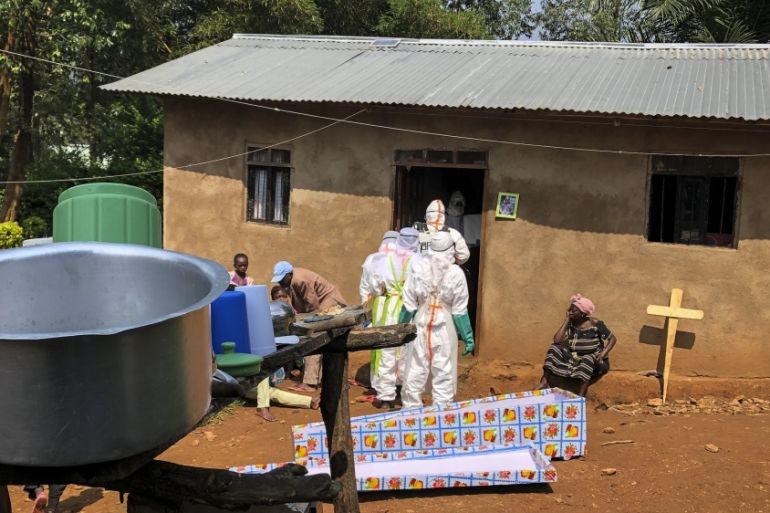Ebola case reported near DR Congo’s border with South Sudan
Case of deadly virus confirmed by South Sudan health ministry in a report seen by The Associated Press.

Authorities have confirmed an Ebola case not far from the Democratic Republic of the Congo’s (DRC) border with South Sudan, a country with a healthcare system weakened by years of civil war, making it vulnerable to the potential spread of the deadly virus.
The case was registered in the town of Ariwara, situated in northeastern Ituri province and about 70km from the border with South Sudan’s Yei River State, according to a report from South Sudan’s health ministry that was viewed on Tuesday by The Associated Press news agency.
Keep reading
list of 4 itemsUganda declares end of Ebola after 4-month outbreak
Uganda’s Ebola outbreak nearly under control, says Africa CDC
Ebola vaccines produced lasting antibodies during trial: Studies
The victim, a 40-year-old woman, had travelled nearly 500km from Beni, in North Kivu province in the DRC, despite having been identified by health officials as having been exposed to Ebola and warned not to travel.
It is the closest confirmed case to South Sudan since an outbreak began in North Kivu last August before spreading to neighbouring Ituri, according to an official with close knowledge of the outbreak who spoke to AP on condition of anonymity.
People who have come into contact with Ebola patients should be monitored for 21 days, the incubation period during which symptoms can emerge after exposure. Long-distance travel, particularly to regions bordering other vulnerable countries, is not recommended.
Fears of regional transmission
More than 2,200 Ebola cases have been confirmed since the virus re-emerged, and more than 1,500 people have died, according to the latest figures from the DRC’s health ministry.
Two fatal cases were reported in Uganda last month, marking the first confirmed cross-border cases of the virus in the current epidemic and prompting major fears the outbreak could be about to enter a new phase of wider regional transmission.
The individuals were part of a family that travelled to the DRC, where the two victims contracted the virus, before returning to Uganda.
While no other fatalities outside of the DRC have emerged since the scare, concerns remain high that Ebola could spread through the region.
Authorities in South Sudan have been preparing for such a possible spread across its border, but the country still remains far less prepared than Uganda.
A five-year civil war in South Sudan has killed nearly 400,000 people, displaced some four million others and put pre-existing poorly-equipped medical facilities under increased strain.
In the DRC, meanwhile, cyclical violence in North Kivu and Ituri, combined with deep community mistrust over Ebola and towards authorities, have hampered emergency responders’ efforts to beat back the epidemic, now the second deadliest of its kind in history.
Scores of attacks on treatment centres and health workers in the DRC have been recorded since the beginning of this year, according to the World Health Organization, which warned last month that a quarter of all cases in the outbreak may be going undetected.
The world’s worst epidemic of Ebola, a haemorrhagic fever, killed about 11,300 people in West Africa as it raced through Guinea, Sierra Leone and Liberia from 2013 to 2016.